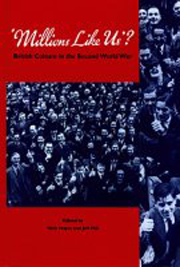Book contents
- Frontmatter
- Contents
- List of Figures and Tables
- Notes on Contributors
- Acknowledgements
- An ‘English War’, Wartime Culture and ‘Millions Like Us’
- British Cinema and ‘The People's War’
- The People's Radio: The BBC and its Audience, 1939–1945
- Was it the Mirror Wot Won it? The Development of the Tabloid Press During the Second World War
- A More Even Playing Field? Sport During and After the War
- A Time for Hard Writers: The Impact of War on Women Writers
- Safe and Sound: New Music in Wartime Britain
- More Than ‘Music-While-You-Eat’? Factory and Hostel Concerts, ‘Good Culture’ and the Workers
- ‘When Work Is Over’: Labour, Leisure and Culture in Wartime Britain
- Not Just a Case of Baths, Canteens and Rehabilitation Centres: The Second World War and the Recreational Provision of the Miners' Welfare Commission in Coalmining Communities
- ‘You and I – All of Us Ordinary People’: Renegotiating ‘Britishness’ in Wartime
- Postscript: A War Imagined
- Index
An ‘English War’, Wartime Culture and ‘Millions Like Us’
- Frontmatter
- Contents
- List of Figures and Tables
- Notes on Contributors
- Acknowledgements
- An ‘English War’, Wartime Culture and ‘Millions Like Us’
- British Cinema and ‘The People's War’
- The People's Radio: The BBC and its Audience, 1939–1945
- Was it the Mirror Wot Won it? The Development of the Tabloid Press During the Second World War
- A More Even Playing Field? Sport During and After the War
- A Time for Hard Writers: The Impact of War on Women Writers
- Safe and Sound: New Music in Wartime Britain
- More Than ‘Music-While-You-Eat’? Factory and Hostel Concerts, ‘Good Culture’ and the Workers
- ‘When Work Is Over’: Labour, Leisure and Culture in Wartime Britain
- Not Just a Case of Baths, Canteens and Rehabilitation Centres: The Second World War and the Recreational Provision of the Miners' Welfare Commission in Coalmining Communities
- ‘You and I – All of Us Ordinary People’: Renegotiating ‘Britishness’ in Wartime
- Postscript: A War Imagined
- Index
Summary
Praise God, now, for an English War –
The Grey Tide and the Sullen Coast,
The menace of the urgent hour,
The single island, like a tower,
Ringed with an angry host.…
When no allies are left, no help
To count upon from alien hands,
No waverers remain to woo,
No more advice to listen to,
And only England stands.
This is a war we always knew.…
Dorothy Sayers's opening words, published shortly after the fall of France and the symbolic resurrection of Dunkirk, typically capture that moment of splendid isolation – dichotomously tensioned by patriotic resolution, yet fearful uncertainty – of the summer of 1940 which, in turn and in so many ways, encapsulates the popular image of Britain in the Second World War then and now. In 1940 Britain stood alone in Europe, and, according to Sayers (and many others), curiously was resolutely glad of this (‘Now we know where we are! No more bloody allies!’, was apparently a common refrain); an island defeated yet still unconquered, vigilant, historically defiant, and despite ‘The flying death that swoops and stuns’, with God's help ready to ‘keep, by might and main,/ Inviolate seas, inviolate skies’ and fight again. This English War (which in its retelling overtly bypasses Celtic sensibilities) was, when so simply put, a war of survival against tyranny; a war England had fought and won before (against Louis, Philip, ‘the conquering Corsican’) so that even foreigners – those ‘men who love us not, yet look/ To us for liberty’ – might too be free. And it was a war Britain now had to win once more.
- Type
- Chapter
- Information
- Millions Like Us?British Culture in the Second World War, pp. 1 - 32Publisher: Liverpool University PressPrint publication year: 1999



